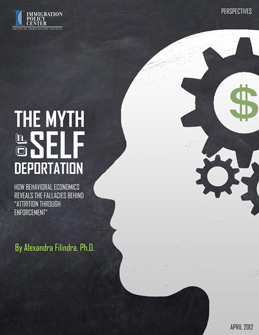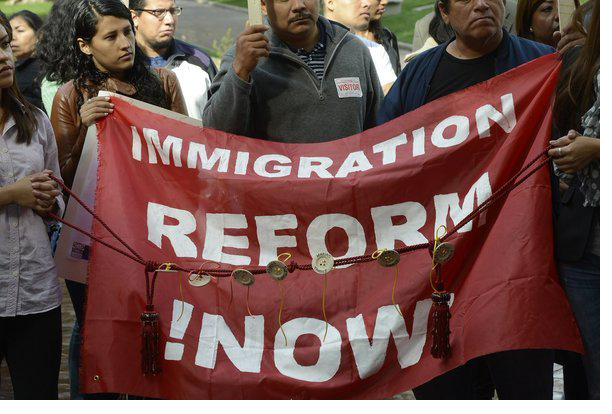
Help us continue the support for free Comprehensive Immigration Reform
_____________________________
What the Bible Really Says about Immigration

Click here to read

Click here to read

Click here to read

News
Stopped by ICE: You Have Rights!
Stopped by Immigration: You Have Rights. Know Them. Use Them.
If you are stopped by Police Officers, Immigration Agents or other public authorities, you have rights. It does not matter if you entered the country by crossing the border in Mexico, if you are an overstay, green card holder or citizen. As long as you are within the borders of the United States, you have rights. Know them. Use them.
WHAT TO DO IF YOU'RE QUESTIONED OR DETAINED BY ICE:
1) No ICE officer should stop anybody based on appearance alone; regardless of your ethnicity, the color of your skin, the way you dress or talk or the language you're speaking. It's the law.
2) If an immigration officer asks for proof that you are a legal resident of the United States and wants to see some identification, you have the right to refuse to give them your ID. You can also refuse to answer any of their questions. Unless they have a warrant, you have no obligation to interact with them at all. You can ask "Am I arrested?" If the answer is no, you do not need to give them any information regarding your legal status in the U.S. Showing them ID is totally optional.
3) If you are being interrogated do not give false information, and do not give them false documentation. You can be charged with identity theft if you show them forged documents, or someone else's documents, even if you have legal status. Remember that everything you say or do can be used against you.
4) If immigration officials (ICE) begin to knock on your door you have the right not to open the door. They only have the right to enter to your home if they have a warrant from a judge.
5) If you are arrested in an immigration detention center and you don't want to return to your home country, you have the right to request a meeting with an immigration officer.
6) Do not sign anything you don't understand. You might be signing a voluntary deportation order.
7) Some cases can be resolved with the help of an immigration attorney. The lawyer can request for a court date to meet with an immigration judge and help solve your case. You don't have the right to an attorney provided by the state, but you do have the right to see your own attorney. Call the Law Firm of Figeroux & Associates, at 855-768-8845
8) Who should you call: Your family member to contact an immigration lawyer. When you enter an immigration center, they will assign you an A#, which is your alien number. Make sure you give your A# to the people you talk to on the outside helping with your case. If you have no one else to call you should call the Law Firm of Figeroux & Associates at 855-768-8845.
IF YOU ARE ARRESTED BY IMMIGRATION OFFICERS:
1. You have the right to remain silent. You do not have to answer questions. You can tell the officer that you want to speak with a lawyer before answering any questions. You may say, "I will remain silent until I speak to an attorney." You do not have the right to an appointed free lawyer, but you do have the right to talk to a lawyer and to hire one on your own.
2. You do not have to sign anything giving up your rights, and should never sign anything without reading it first and understanding the consequences of signing it. Signing a document without understanding it could result in you being deported before you see a lawyer or a judge.
3. Talk to a lawyer before signing anything or making a decision about your situation. If possible, carry with you the name and telephone number of a lawyer who will take your calls. Immigration law is hard to understand. You may have options that immigration officers will not explain.
4. If you are not a U.S. citizen, you have the right to call your consulate or to have a law enforcement officer tell consulate officials of your arrest. Law enforcement officers must let your consulate visit or speak with you if consular officials decide to do so. Your consulate might be able to help you find a lawyer. To hire the Law Firm of Figeroux & Associates, call 855-768-8845.
WHAT ARE YOUR RIGHTS
* You have the right to remain silent. If you wish to exercise that right, say so out loud.
* You have the right to refuse to consent to a search of yourself, your car or your home.
* If you are not under arrest, you have the right to calmly leave.
* You have the right to a lawyer if you are arrested. Call the Immigration Law and Deportation Defense Law Firm, Figeroux & Associates at (855) 768-8845, 24 hours a day/ 7 days a week.
* Regardless of your immigration or citizenship status, you have constitutional rights. Exercise those rights.
WHAT ARE YOUR RESPONSIBILITIES
* Stay calm and be polite.
* Don't interfere with or obstruct the police.
* Don't lie or give false documents.
* Be prepared in case you are arrested.
* Remember the details of the encounter.
* Call the Immigration Law and Deportation Defense Law Firm, Figeroux & Associates at (855-768-8845, 24 hours a day/ 7 days a week if you feel your rights have been violated.
WHAT TO DO IF YOU ARE STOPPED FOR QUESTIONING
* Remain calm. Don't run, argue, resist or obstruct the police, even if you are innocent or the police are violating your rights.
* Keep your hands where police can see them.
* Ask if you can leave. If the officer says yes, calmly and silently walk away. If you are under arrest, you have a right to know why. Don't be afraid to ask why you are under arrest.
* Like every American, you have the right to remain silent and cannot be punished for refusing to answer questions. If you do not wish to speak to the officer, simply tell the officer that you want to remain silent.
* You can refuse an officer's request to search your body or your belongings. Police are permitted to "pat down" your clothing if they suspect a weapon. You should not physically resist, but you have the right to refuse consent for any further search. If you do consent, it can affect you later in court.
WHAT TO DO IF YOU ARE STOPPED IN YOUR CAR
* Stop the car in a safe place as quickly as possible.
* Turn off the car, turn on the internal light, open the window part way and place your hands on the wheel.
* Upon request, show police your driver's license, registration and proof of insurance.
* If an officer or immigration agent asks to look inside your car, you can refuse to consent to the search. But if police believe your car contains evidence of a crime, your car can be searched without your consent.
* The driver and all passengers have the right to remain silent. If you are a passenger, you can ask if you are free to leave. If the officer says yes, sit silently or calmly leave. Even if the officer says no, you have the right to remain silent.
WHAT TO DO IF YOU ARE QUESTIONED ABOUT YOUR IMMIGRATION STATUS
You have the right to remain silent. You need not talk about your immigration or citizenship status with police, immigration agents or any other officials. You do not have to answer questions about where you were born, whether you are a U.S. citizen, or how you entered the country. Just stay quiet, as you talking could hurt your chances at potential immigration relief in the future.
If you are not a U.S. citizen and an immigration agent requests your immigration papers, you must show them if you have them with you. If you are over 18, carry your immigration documents with you at all times. If you do not have immigration papers, say you want to remain silent.
Do not lie about your citizenship status or provide fake documents. If you claim that you are a United States Citizen and you are not, you can face serious criminal issues. Also, it is better to remain silent, than to provide fake documents.
Contact the Immigration Law and Deportation Defense Firm Figeroux & Associates at (855) 768- 8845 as soon as you can. Or, contact a family member and tell them to call Figeroux & Associates twenty-four hour emergency line (855) 768-8845.
WHAT TO DO IF YOU ARE TAKEN INTO IMMIGRATION (OR "ICE") CUSTODY
* You have the right to a lawyer. Tell ICE that you want to call your lawyer and call the Immigration Law & Deportation Defense Law Firm of Figeroux & Associates at (855) 768-8845. Call 24 hours a day/7 days a week.
* You have the right to contact your consulate or have an officer inform the consulate of your arrest.
* Tell the ICE agent you wish to remain silent. Do not discuss your immigration status with anyone but your Figeroux & Associates lawyer.
* Refuse to sign any documents, such as a voluntary departure or stipulated removal, without talking to your Figeroux & Associates lawyer.
* Request and remember your immigration number ("A" number) so that you can provide it to your Figeroux & Associates deportation defense lawyer at Figeroux & Associates.
Every situation is different, so make sure that you think about every step you take. When in doubt, call the Immigration Law and Deportation Defense Firm of Figeroux & Associates at (855) 768-8845.
- - - - - - - - - - - - - - - - - - - - - - - - - - - - - - - - - - - - - - - - - - - - - - - - - - - - - - - - - - - - - - - - - - - - - - - - - - - - -
Trump's Immigration Plan Will Destroy the U.S. Economy, Cause a Brain Drain and Violate Human Rights

Photo Credit: saynotogrump.com
Celebrity Apprentice, no more! This is the real deal. America, he's hired. Yes, Donald Trump, the bombastic reality-TV-star-turned-politician is the president-elect of the United States of America. Here, we outline Donald' Trump's vision (www.donaldjtrump.com/policies/immigration/) on immigration that will surely destroy the U.S. economy, cause a brain drain and violate human rights if implemented:
•Prioritize the jobs, wages and security of the American people.
•Establish new immigration controls to boost wages and to ensure that open jobs are offered to American workers first.
•Protect the economic well-being of the lawful immigrants already living here by curbing uncontrolled foreign worker admissions
•Select immigrants based on their likelihood of success in the U.S. and their ability to be financially self-sufficient.
•Vet applicants to ensure they support America's values, institutions and people, and temporarily suspend immigration from regions that export terrorism and where safe vetting cannot presently be ensured.
•Enforce the immigration laws of the United States and restore the Constitutional rule of law upon which America's prosperity and security depend.
Donald J. Trump's 10 Point Plan to Put America First
1. Begin working on an impenetrable physical wall on the southern border, on day one. Mexico will pay for the wall.
2. End catch-and-release. Under a Trump administration, anyone who illegally crosses the border will be detained until they are removed out of our country.
3. Move criminal aliens out day one, in joint operations with local, state, and federal law enforcement. We will terminate the Obama administration's deadly, non-enforcement policies that allow thousands of criminal aliens to freely roam our streets.
4. End sanctuary cities.
5. Immediately terminate President Obama's two illegal executive amnesties. All immigration laws will be enforced - we will triple the number of ICE agents. Anyone who enters the U.S. illegally is subject to deportation. That is what it means to have laws and to have a country.
6. Suspend the issuance of visas to any place where adequate screening cannot occur, until proven and effective vetting mechanisms can be put into place.
7. Ensure that other countries take their people back when we order them deported.
8. Ensure that a biometric entry-exit visa tracking system is fully implemented at all land, air, and sea ports.
9. Turn off the jobs and benefits magnet. Many immigrants come to the U.S. illegally in search of jobs, even though federal law prohibits the employment of illegal immigrants.
10. Reform legal immigration to serve the best interests of America and its workers, keeping immigration levels within historic norms.
KEY ISSUES
•Illegal immigrants and other non-citizens in our prisons and jails together had around 25,000 homicide arrests to their names. [United States Government
Accountability Office, March 2011] •Current immigration policy costs taxpayers $300 billion a year [National Review, Sept. 22, 2016]
•There are at least 2 million convicted criminal aliens now inside the country. [Center for Immigration Studies, Oct. 2013
•Since 2013 alone, the Obama Administration has allowed 300,000 criminal aliens to return back into U.S. communities.
•Between 9/11 and the end of 2014, at least 380 foreign-born individuals were convicted in terror cases inside the United States. [U.S. Senate Immigration Subcommittee, June 22, 2016]
•In the last five years, we've admitted nearly 100,000 immigrants from Iraq and Afghanistan – in these two countries, according to Pew research, a majority of residents say that the barbaric practice of honor killings against women are often or sometimes justified. [U.S. Department of Homeland Security, August 2016], [Pew Research Center, July 22, 2016]
•From the year 2008 through 2014, nearly 13,000 criminal aliens were released back into U.S. communities because their home countries would not take them back. [The Boston Globe, June 4, 2016]
•62 percent of households headed by illegal immigrants used some form of cash or non-cash welfare programs, like food stamps or housing assistance. [Center for Immigration Studies, Sept. 2015]
•Nearly 1 million illegal immigrants, including nearly 200,000 with criminal convictions, had been ordered deported but remain at large. [Washington Examiner, July 1, 2015
•Between 2013 and 2015, the Obama Administration released over 86,000 criminal aliens from custody. In 2015 alone, ICE freed 19,723 criminal aliens, who had 64,197 convictions among them. These included 8,234 violent convictions and 208 homicide convictions. [Homeland]
- - - - - - - - - - - - - - - - - - - - - - - - - - - - - - - - - - - - - - - - - - - - - - - - - - - - - - - - - - - - - - - - - - - - - - - - - - - - -
What Hillary Clinton Can Do To Show that Immigrant Families Matter.

CENTER FOR HUMAN RIGHTS & CONSTITUTIONAL LAW
May 1, 2016
Peter Schey pschey@centerforhumanrights.org [1]
Bill Clinton dealt a major setback to rational immigration policy in 1996 when he signed the Illegal Immigration Reform and Immigrant Responsibility Act for the first time in history adopting "bars" that would block millions of immigrants from legalizing their status even though they qualified for immigrant visas through their U.S. citizen or lawful resident spouses, parents or children.
This law now accounts for about two million undocumented immigrants living in the U.S. with Government-issued "approved" visa petitions, but unable to legalize their status. Hillary Clinton could endorse an easy solution to legalize these immigrants with no change in existing law.
In 1996 President Clinton signed into law several new bars to legalization for those previously eligible to get permanent resident status. One of the bars states that any immigrant who entered the country without inspection and has been present without lawful status for twelve months or longer faces a ten-year bar. These immigrants must go home for ten years before they can get a green card.
Since 1996, millions of immigrants who entered the country without inspection became eligible for permanent resident status through marriages to U.S. citizens or their U.S. citizen parents or other close family members. Their family members applied for family-based visas and the Government approved these petitions. By entering the visa system, these immigrants have played by the rules. DHS knows exactly who they are, where they live and when and where they were born.
From time to time these immigrants travel to their home countries to visit family or for other legitimate reasons. Under long-standing Government policy, a small number are given permission to leave the U.S. and return with inspection if they can document a family emergency such as the death of an immediate family member. They are given "advance parole" -- authorization to travel so that the Government knows when they leave and when they return.
The vast majority of immigrants with approved visa petitions do not qualify for advance parole because they don't have a dire family emergency in their home countries. They just want to visit family or travel for other lawful purposes. They depart and return without inspection, diverting the limited resources of the U.S. Border Patrol.
The 1996 rule not only encourages unlawful reentries after immigrants briefly visit their countries of birth, it has caused the undocumented population to mushroom in size because remaining with their families is more important to the vast majority of immigrants than going home for ten years to get a green card. Family values trump administrative visa rules. Every year since 1996 the Government has approved thousands of visas for immigrants who cannot legalize their status because they face the ten-year bar.
Hillary Clinton, or whoever wins the White House, can direct the Department of Homeland Security to allow immigrants with approved visa petitions to travel to visit their families or for any other lawful purposes. This would be smart border enforcement as no one benefits when these immigrants travel and return illegally. The Government should want to know when immigrants in its system are leaving and returning to the country.
By allowing these immigrants to briefly travel abroad and be inspected upon return, they become eligible to adjust their status in the U.S. because now their most recent entry was with inspection. Many of these immigrants could become lawful residents within months after returning from brief trips with inspection.
The benefits to the country are clear. We would quickly and without cost reduce the undocumented population by ten to twenty percent. We would allow those with by far the greatest equities to emerge from the underground and integrate into the fabric of their communities. These immigrants would start working legally instead of illegally.
This policy would also show that immigrant families matter. The 1996 bars President Clinton signed serve as a visa death penalty for immigrants whose only offense years ago was to flee violence or crushing poverty in order to secure their safety or provide for their families.
Hillary Clinton should commit that if elected she'll allow immigrants with approved visa petitions to briefly travel and return with inspection. This would be smart border enforcement and a blessing to a couple of million families now living in fear that any day their parents, spouses or children may be detected and deported because of a law her husband signed twenty years ago not appreciating either the role it would play in expanding the undocumented population or the long-term suffering it would cause.
/ / /
[1] President of the Center for Human Rights and Constitutional Law, Los Angeles, CA. Class Counsel in several federal class action cases involving the legalization of immigrants; assisted Congress in drafting bi-partisan legalization laws enacted in 1986 (IRCA) and 2000 (LIFE Act).
- - - - - - - - - - - - - - - - - - - - - - - - - - - - - - - - - - - - - - - - - - - - - - - - - - - - - - - - - - - - - - - - - - - - - - - - - - - - -
President Obama Announces New Steps to Fix Our Broken Immigration System
WASHINGTON — November 20, 2014 (Whitehouse.gov) In an address to the nation, President Obama lays out the executive action he's taking to fix our nation's broken immigration system.
Click here for details on the Executive Actions on Immigration
Full Transcript:
THE PRESIDENT: My fellow Americans, tonight, I'd like to talk with you about immigration.
For more than 200 years, our tradition of welcoming immigrants from around the world has given us a tremendous advantage over other nations. It's kept us youthful, dynamic, and entrepreneurial. It has shaped our character as a people with limitless possibilities — people not trapped by our past, but able to remake ourselves as we choose.
But today, our immigration system is broken — and everybody knows it.
Families who enter our country the right way and play by the rules watch others flout the rules. Business owners who offer their workers good wages and benefits see the competition exploit undocumented immigrants by paying them far less. All of us take offense to anyone who reaps the rewards of living in America without taking on the responsibilities of living in America. And undocumented immigrants who desperately want to embrace those responsibilities see little option but to remain in the shadows, or risk their families being torn apart.
It's been this way for decades. And for decades, we haven't done much about it.
When I took office, I committed to fixing this broken immigration system. And I began by doing what I could to secure our borders. Today, we have more agents and technology deployed to secure our southern border than at any time in our history. And over the past six years, illegal border crossings have been cut by more than half. Although this summer, there was a brief spike in unaccompanied children being apprehended at our border, the number of such children is now actually lower than it's been in nearly two years. Overall, the number of people trying to cross our border illegally is at its lowest level since the 1970s. Those are the facts.
Meanwhile, I worked with Congress on a comprehensive fix, and last year, 68 Democrats, Republicans, and independents came together to pass a bipartisan bill in the Senate. It wasn't perfect. It was a compromise. But it reflected common sense. It would have doubled the number of border patrol agents while giving undocumented immigrants a pathway to citizenship if they paid a fine, started paying their taxes, and went to the back of the line. And independent experts said that it would help grow our economy and shrink our deficits.
Had the House of Representatives allowed that kind of bill a simple yes-or-no vote, it would have passed with support from both parties, and today it would be the law. But for a year and a half now, Republican leaders in the House have refused to allow that simple vote.
Now, I continue to believe that the best way to solve this problem is by working together to pass that kind of common sense law. But until that happens, there are actions I have the legal authority to take as President — the same kinds of actions taken by Democratic and Republican presidents before me -– that will help make our immigration system more fair and more just.
Tonight, I am announcing those actions.
First, we'll build on our progress at the border with additional resources for our law enforcement personnel so that they can stem the flow of illegal crossings, and speed the return of those who do cross over.
Second, I'll make it easier and faster for high-skilled immigrants, graduates, and entrepreneurs to stay and contribute to our economy, as so many business leaders have proposed.
Third, we'll take steps to deal responsibly with the millions of undocumented immigrants who already live in our country.
I want to say more about this third issue, because it generates the most passion and controversy. Even as we are a nation of immigrants, we're also a nation of laws. Undocumented workers broke our immigration laws, and I believe that they must be held accountable -– especially those who may be dangerous. That's why, over the past six years, deportations of criminals are up 80 percent. And that's why we're going to keep focusing enforcement resources on actual threats to our security. Felons, not families. Criminals, not children. Gang members, not a mom who's working hard to provide for her kids. We'll prioritize, just like law enforcement does every day.
But even as we focus on deporting criminals, the fact is, millions of immigrants in every state, of every race and nationality still live here illegally. And let's be honest -– tracking down, rounding up, and deporting millions of people isn't realistic. Anyone who suggests otherwise isn't being straight with you. It's also not who we are as Americans. After all, most of these immigrants have been here a long time. They work hard, often in tough, low-paying jobs. They support their families. They worship at our churches. Many of their kids are American-born or spent most of their lives here, and their hopes, dreams, and patriotism are just like ours. As my predecessor, President Bush, once put it: "They are a part of American life."
Now here's the thing: We expect people who live in this country to play by the rules. We expect that those who cut the line will not be unfairly rewarded. So we're going to offer the following deal: If you've been in America for more than five years; if you have children who are American citizens or legal residents; if you register, pass a criminal background check, and you're willing to pay your fair share of taxes — you'll be able to apply to stay in this country temporarily without fear of deportation. You can come out of the shadows and get right with the law. That's what this deal is.
Now, let's be clear about what it isn't. This deal does not apply to anyone who has come to this country recently. It does not apply to anyone who might come to America illegally in the future. It does not grant citizenship, or the right to stay here permanently, or offer the same benefits that citizens receive -– only Congress can do that. All we're saying is we're not going to deport you.
I know some of the critics of this action call it amnesty. Well, it's not. Amnesty is the immigration system we have today -– millions of people who live here without paying their taxes or playing by the rules while politicians use the issue to scare people and whip up votes at election time.
That's the real amnesty — leaving this broken system the way it is. Mass amnesty would be unfair. Mass deportation would be both impossible and contrary to our character. What I'm describing is accountability — a common-sense, middle-ground approach: If you meet the criteria, you can come out of the shadows and get right with the law. If you're a criminal, you'll be deported. If you plan to enter the U.S. illegally, your chances of getting caught and sent back just went up.
The actions I'm taking are not only lawful, they're the kinds of actions taken by every single Republican President and every single Democratic President for the past half century. And to those members of Congress who question my authority to make our immigration system work better, or question the wisdom of me acting where Congress has failed, I have one answer: Pass a bill.
I want to work with both parties to pass a more permanent legislative solution. And the day I sign that bill into law, the actions I take will no longer be necessary. Meanwhile, don't let a disagreement over a single issue be a dealbreaker on every issue. That's not how our democracy works, and Congress certainly shouldn't shut down our government again just because we disagree on this. Americans are tired of gridlock. What our country needs from us right now is a common purpose — a higher purpose.
Most Americans support the types of reforms I've talked about tonight. But I understand the disagreements held by many of you at home. Millions of us, myself included, go back generations in this country, with ancestors who put in the painstaking work to become citizens. So we don't like the notion that anyone might get a free pass to American citizenship.
I know some worry immigration will change the very fabric of who we are, or take our jobs, or stick it to middle-class families at a time when they already feel like they've gotten the raw deal for over a decade. I hear these concerns. But that's not what these steps would do. Our history and the facts show that immigrants are a net plus for our economy and our society. And I believe it's important that all of us have this debate without impugning each other's character.
Because for all the back and forth of Washington, we have to remember that this debate is about something bigger. It's about who we are as a country, and who we want to be for future generations.
Are we a nation that tolerates the hypocrisy of a system where workers who pick our fruit and make our beds never have a chance to get right with the law? Or are we a nation that gives them a chance to make amends, take responsibility, and give their kids a better future?
Are we a nation that accepts the cruelty of ripping children from their parents' arms? Or are we a nation that values families, and works together to keep them together?
Are we a nation that educates the world's best and brightest in our universities, only to send them home to create businesses in countries that compete against us? Or are we a nation that encourages them to stay and create jobs here, create businesses here, create industries right here in America?
That's what this debate is all about. We need more than politics as usual when it comes to immigration. We need reasoned, thoughtful, compassionate debate that focuses on our hopes, not our fears. I know the politics of this issue are tough. But let me tell you why I have come to feel so strongly about it.
Over the past few years, I have seen the determination of immigrant fathers who worked two or three jobs without taking a dime from the government, and at risk any moment of losing it all, just to build a better life for their kids. I've seen the heartbreak and anxiety of children whose mothers might be taken away from them just because they didn't have the right papers. I've seen the courage of students who, except for the circumstances of their birth, are as American as Malia or Sasha; students who bravely come out as undocumented in hopes they could make a difference in the country they love.
These people — our neighbors, our classmates, our friends — they did not come here in search of a free ride or an easy life. They came to work, and study, and serve in our military, and above all, contribute to America's success.
Tomorrow, I'll travel to Las Vegas and meet with some of these students, including a young woman named Astrid Silva. Astrid was brought to America when she was four years old. Her only possessions were a cross, her doll, and the frilly dress she had on. When she started school, she didn't speak any English. She caught up to other kids by reading newspapers and watching PBS, and she became a good student. Her father worked in landscaping. Her mom cleaned other people's homes. They wouldn't let Astrid apply to a technology magnet school, not because they didn't love her, but because they were afraid the paperwork would out her as an undocumented immigrant — so she applied behind their back and got in. Still, she mostly lived in the shadows — until her grandmother, who visited every year from Mexico, passed away, and she couldn't travel to the funeral without risk of being found out and deported. It was around that time she decided to begin advocating for herself and others like her, and today, Astrid Silva is a college student working on her third degree.
Are we a nation that kicks out a striving, hopeful immigrant like Astrid, or are we a nation that finds a way to welcome her in? Scripture tells us that we shall not oppress a stranger, for we know the heart of a stranger — we were strangers once, too.
My fellow Americans, we are and always will be a nation of immigrants. We were strangers once, too. And whether our forebears were strangers who crossed the Atlantic, or the Pacific, or the Rio Grande, we are here only because this country welcomed them in, and taught them that to be an American is about something more than what we look like, or what our last names are, or how we worship. What makes us Americans is our shared commitment to an ideal -– that all of us are created equal, and all of us have the chance to make of our lives what we will.
That's the country our parents and grandparents and generations before them built for us. That's the tradition we must uphold. That's the legacy we must leave for those who are yet to come.
Thank you. God bless you. And God bless this country we love.
END
Comprehensive Immigration Reform
The Senate Judiciary Committee voted with a strong bipartisan majority on Tuesday May 2013 to advance comprehensive immigration legislation that would put 11 million illegal immigrants on a path to citizenship. The legislation raises caps on high-skilled workers and creates a new visa program for low-skilled workers.It would allocate billions of dollars to securing the southwestern border and tracking visas at airports and seaports around the country. It would make E-Verify mandatory for employers across the country in order to crack down on illegal workers and deter future waves of illegal immigration. The legislation passed by a vote of 13 to 5 with three Republicans joining 10 Democrats to approve the measure. Senate Majority Leader Harry Reid (D-Nev.) has said it will come to the floor next month.
The three Republicans voting "yes" were Sens. Lindsey Graham (S.C.) and Jeff Flake (Ariz.), who are members of the Gang of Eight, which crafted the bill, and Sen. Orrin Hatch (Utah). Text of S.744 as introduced on 4/16/13. Do not include amendments. On May 29, 2013, the Senate Judiciary committee release an updated version of the "Border Security, Economic Opportunity, and Immigration Modernization Act" that reflects the amendments that were passed during the committee mark-up. For a copy, click here. For a free consultation on Comprehensive Immigration Reform courtesy the Law Office of Figeroux & Associates, click here.
 The Immigrant’s Journal Legal and Educational Fund, Inc., news section. In our Journal’s monthly publication we focus on updating old and new immigrants to the United States, on immigration issues such as: How to Get A Green Card, Citizenship, Deportation Issues, Settling in the United States, Political Asylum and Refugee Issues. Other important issues we focus on are: Immigration Fraud Prevention, Identity Theft, Purchasing a Home, Civil Rights Issues, Staring a Business and other issues all Americans are concerned about.
The Immigrant’s Journal Legal and Educational Fund, Inc., news section. In our Journal’s monthly publication we focus on updating old and new immigrants to the United States, on immigration issues such as: How to Get A Green Card, Citizenship, Deportation Issues, Settling in the United States, Political Asylum and Refugee Issues. Other important issues we focus on are: Immigration Fraud Prevention, Identity Theft, Purchasing a Home, Civil Rights Issues, Staring a Business and other issues all Americans are concerned about.
Please take some time to review our informative publication, the Immigrant’s Journal. Additionally, by advertising or donating towards the publication your contribution will help with the production and distribution costs. Our publication is a free publication, but there are costs equated with production, and distribution. The Immigrant’s Journal is a publication of I.Q., Inc., who publish this publication basically for free. The Law Office of Figeroux & Associates is an avid supporter of this publication and the Journal’s Free Citizenship Assistance Drive.
Our publication is distributed to thousands of readers on the streets, though subway station distribution, and on the newsstands of small businesses throughout the immigrant diaspora. Additionally, we have now made the publication available on our website. Again, the Immigrant’s Journal is designed and edited to provide a balanced selection of the top stories relevant to our readers, as well as editorial commentary on legal issues, life lessons, sports, beauty, health and wellness, and business news.
- - - - - - - - - - - - - - - - - - - - - - - - - - - - - - - - - - - - - - - - - - - - - - - - - - - - - - - - - - - - - - - - - - - - - - - - - - - - -
Statement by the President on Commonsense Immigration Reform
 This afternoon, Senators Schumer and McCain briefed me on the bipartisan immigration reform bill that they have drafted with their colleagues in the Senate. This bill is clearly a compromise, and no one will get everything they wanted, including me. But it is largely consistent with the principles that I have repeatedly laid out for comprehensive reform. This bill would continue to strengthen security at our borders and hold employers more accountable if they knowingly hire undocumented workers. It would provide a pathway to earned citizenship for the 11 million individuals who are already in this country illegally. And it would modernize our legal immigration system so that we’re able to reunite families and attract the highly-skilled entrepreneurs and engineers who will help create good paying jobs and grow our economy. These are all commonsense steps that the majority of Americans support. I urge the Senate to quickly move this bill forward and, as I told Senators Schumer and McCain, I stand willing to do whatever it takes to make sure that comprehensive immigration reform becomes a reality as soon as possible.
This afternoon, Senators Schumer and McCain briefed me on the bipartisan immigration reform bill that they have drafted with their colleagues in the Senate. This bill is clearly a compromise, and no one will get everything they wanted, including me. But it is largely consistent with the principles that I have repeatedly laid out for comprehensive reform. This bill would continue to strengthen security at our borders and hold employers more accountable if they knowingly hire undocumented workers. It would provide a pathway to earned citizenship for the 11 million individuals who are already in this country illegally. And it would modernize our legal immigration system so that we’re able to reunite families and attract the highly-skilled entrepreneurs and engineers who will help create good paying jobs and grow our economy. These are all commonsense steps that the majority of Americans support. I urge the Senate to quickly move this bill forward and, as I told Senators Schumer and McCain, I stand willing to do whatever it takes to make sure that comprehensive immigration reform becomes a reality as soon as possible.
Ten Reasons Why Comprehensive Reform Should Be Washington’s Top Priority
By Vandell Park
 Comprehensive Immigration Reform (CIR) is considered a hot button issue for law makers in Washington. However, the overwhelming support given to President Barack Obama and the Democratic Party by immigrant voters at the 2012 general elections has re-energized the conversation on the urgency of passing legislation to legalize the some 11.5 million undocumented aliens living in the United States.
Comprehensive Immigration Reform (CIR) is considered a hot button issue for law makers in Washington. However, the overwhelming support given to President Barack Obama and the Democratic Party by immigrant voters at the 2012 general elections has re-energized the conversation on the urgency of passing legislation to legalize the some 11.5 million undocumented aliens living in the United States.
Since the elections, statisticians, pollsters and political pundits have attributed the return of President Obama to the White House due to the 70% of Latino voters across the country. In fact, the Republicans who showed little interest and openly denounced efforts to legalize undocumented aliens prior to the elections, have since shifted position on the issue and are now in some instances leading the debate for immigration reform. Top Republican legislators such as John Boehner, John McCain, Eric Cantor and Lindsay Graham are among those calling for immediate action on an immigration overhaul.
What can be more encouraging about the subject than to have the Speaker of the House of Represeatives, John Boehner, the person responsible for tabling the legislation, calling for urgent action? Boehner, speaking on the issue since the elections said: “This issue has been around far too long and while I believe it’s important for us to secure our borders and to enforce our laws, I think a comprehensive approach is long overdue, and I’m confident that the president, myself, others, can find common ground to take on this issue once and for all.”
President Obama, recognizing that voters at the 2012 elections have given him a mandate to ensure legislation on comprehensive immigration reform, addressed the issue head on. At his press conference held on November 14, 2012, days after his re-election, the president, speaking on the subject declared: “You're starting to see a sense of empowerment and civic participation that I think is going to be powerful and good for the country. And it is why I’m very confident that we can get immigration reform done. Before the election I had given a couple [of] interviews where I predicted that the Latino vote was going to be strong, and that that would cause some reflection on the part of Republicans about their position on immigration reform. I think we’re starting to see that already. I think that's a positive sign. So we need to seize the moment. And my expectation is that we get a bill introduced and we begin the process in Congress very soon after my inauguration. And in fact, some conversations I think are already beginning to take place among senators and congressmen and my staff about what would this look like.”
The president strategically outlined some measures that will be critical to this country’s growth and development once immigration reform is enacted. Among the positive developments to spin off of this legislation, is the significant economic contribution that will boost state coffers. The president could not have set the stage differently: “And when I say comprehensive immigration reform, it is very similar to the outlines of previous efforts at comprehensive immigration reform. I think it should include a continuation of the strong border security measures that we’ve taken because we have to secure our borders. I think it should contain serious penalties for companies that are purposely hiring undocumented workers and taking advantage of them. And I do think that there should be a pathway for legal status for those who are living in this country, are not engaged in criminal activity, are here simply to work. It’s important for them to pay back-taxes. It’s important for them to learn English. It’s important for them to potentially pay a fine. But to give them the avenue whereby they can resolve their legal status here in this country I think is very important.”
Well the president has certainly set the stage for Comprehensive Immigration Reform and here are ten reasons why it should be done with utmost urgency.
1. Huge Economic Dividends for the Country: A number of states stand to benefit from a monetary policy initiative should the eleven million undocumented immigrants be legalized. An estimated $12.3 billion could be added to states coffers should the country enforce the $1,070 adjustment of status fee, or, $5.2 billion should the $450 permanent residence registration fee is charged. In addition, a report by Ann Garcia and Marshall Fitz of the Center for American Progress, states that CIR can boost the country’s GDP by some $1.5 trillion, with legal status and labor rights which will translate into higher wages and spin off into “increased consumer purchasing power, which would benefit the U.S economy as a whole.”
2. A Stronger and Reliable Legalized workforce: A number of farming states can now hire workers without fear of them being rounded up by immigration authorities. The recent enforcement of stringent immigration policies by some states resulted in huge financial losses to farmers because their largely illegal workforce were forced into hiding and could not work due to the draconian immigration policies.
3. Increased Tax Payments to the State and Federal Treasury: Since the immigrant workforce in farming, childcare, construction and to some extent, hotel and restaurant industries would gain legal status, more taxes are expected to be paid. This development will augur well for the financial gains for both federal and states treasuries.
4. A Stable Family Environment-Decrease in Foster Care Issues: The current situation regarding the deportation of parents, whose children are American citizens, puts a strain on the foster care system. Many children of these undocumented deported or incarcerated parents are placed in foster care. With the legalizing of the status of these parents, those children will be privileged to enjoy a stable family environment, and in some instances reunite with their parents who have been placed on the deportation roster.
5. Financial Benefit to Insurance Companies and Healthcare Providers: Once the undocumented are legalized, they will require health care and coverage to cater to their health needs. This will contribute significantly to the insurance coffers and the various health care providers and facilities.
6. Entrepreneurial Advancement and Job Growth: Many undocumented immigrants are capable entrepreneurs. Once the opportunity is made available through immigration reform, they will pursue their dreams of setting up businesses which will eventually provide jobs to thousands. Their businesses will also contribute to the economic advancement of the state and the country in general.
7. Housing Development: Many of the 11.5 million undocumented immigrants are currently sharing apartments. Once they receive legal status, they will seek independence and will either rent their own apartments or purchase their own homes. This will certainly boost the housing slump that currently plagues the country. This will also contribute to the financial services industry and the insurance companies.
8. Political Benefits: If the consensus reached regarding the impact of immigrants votes on the 2012 general elections results are true, then politicians at the presidential level, Congress, the Senate and the state level stand to benefit from Comprehensive Immigration Reform. At the state level, politicians can campaign on the strength of the immigrant demographic found in their districts, while at the federal level, proper representation of the immigrant community can determine the outcome of the presidency, the Senate or the Congress.
9. A More Educated Workforce: Some 2.1 million undocumented young people are accessing the school system and graduating with honors in their respective fields of study. Once they are legalized, they will significantly contribute to the labor market. Many will become entrepreneurs, while others will staff the various health, agricultural, industrial, education and military institutions. In addition, many of the undocumented are academically qualified in various fields. They will utilize these skills once they are made legitimate citizens and permanent residents of this country.
10. Release of Financial Burden on Both the Local and Federal Government: Research by the Federation for American Immigration Reform conducted in 2010/2011 revealed that illegal immigrants cost taxpayers some $113 billion annually. According to the report, $84 billion of this burden falls on the state, while $29 billion affects the federal coffers. The bulk of this is spent on education for undocumented children. Once CIR legislation is in place, this huge financial burden will be lifted.
Having looked at these ten reasons for immediate action on Comprehensive Immigration Reform, the onus is now on lawmakers to act. It is likely that the issue will receive early attention in the new Congress as many Republicans--over 20 of their prominent leaders-- are championing the cause. President Obama is committed to making CIR a reality: “my expectation is that we get a bill introduced and we begin the process in Congress very soon after my inauguration."
 From our Blog
From our Blog
- Apply for Deferred Action
 Figeroux and Associates are dedicated to the practice of immigration law. We handle many us immigration cases on behalf of clients throughout the United States and from around the world. We can represent you no matter where you live...
Figeroux and Associates are dedicated to the practice of immigration law. We handle many us immigration cases on behalf of clients throughout the United States and from around the world. We can represent you no matter where you live...
Read More
- B2 Tourist Visa
 Want to come visit the United States?Visit the U.S. for up to one year, we can help you obtain this B2 tourist visa even if you have been denied before...
Want to come visit the United States?Visit the U.S. for up to one year, we can help you obtain this B2 tourist visa even if you have been denied before...
Read More
- K1 Fiancee Visa and K3 Marriage
 Visa Learn about the difference between a K1 Fiancee Visa and K3Marriage A K1 visa is a United States non immigrant visa benefitting fiancé and fiancée of US citizen petitioners...
Visa Learn about the difference between a K1 Fiancee Visa and K3Marriage A K1 visa is a United States non immigrant visa benefitting fiancé and fiancée of US citizen petitioners... - Read More
- How will Comprehensive Immigration Reform, CIR, affect me?
 America is a nation of immigrants. Our American journey and our success would simply not be possible without the generations of immigrants who have come to our shores from every corner of the globe. It is helpful to take a moment to reflect on the important contributions by the generations of immigrants who have helped us build our economy, and made America the economic engine of the world.
America is a nation of immigrants. Our American journey and our success would simply not be possible without the generations of immigrants who have come to our shores from every corner of the globe. It is helpful to take a moment to reflect on the important contributions by the generations of immigrants who have helped us build our economy, and made America the economic engine of the world.
Read More
- Student Visas
 Want to study or go to college in the US? F1 Visas. An alien who has a residence in a foreign country which he/she has no intention of abandoning, who wishes to come to the United States to pursue a course of study...
Want to study or go to college in the US? F1 Visas. An alien who has a residence in a foreign country which he/she has no intention of abandoning, who wishes to come to the United States to pursue a course of study...
Read More
- Diversity Visa Program: DV-2014 Entry Instructions
 The Diversity Immigrant Visa program is a United States congressionally mandated lottery program for receiving a United States Permanent Resident Card. It is also known as the Green Card Lottery. The lottery is administered on an annual basis by the Department of State and conducted under the terms of Section 203(c). Read More
The Diversity Immigrant Visa program is a United States congressionally mandated lottery program for receiving a United States Permanent Resident Card. It is also known as the Green Card Lottery. The lottery is administered on an annual basis by the Department of State and conducted under the terms of Section 203(c). Read More
 Important Links
Important Links
To verify employee information with the USCIS, use E-Verify, click here
To check your case status online or to register for email notifications on your case, click here.
To change your address with the USCIS, click here
To locate your local Immigration Service Center of the USCIS Service, click here.
For the processing time on various forms filed with the USCIS, click here.
To apply for your United States Passport, click here.
To check the status of a Freedom of Information Act request, click here.
To check the Priority Date, Visa Bulletin of applications with the USCIS, click here.
To find a USCIS Authorized Medical Doctor,
close to you, click here.
To check the latest Filing Fees, click here.
To schedule an appointment with the USCIS, that is an Infopass, click here.
To locate the address and telephone number for your Consulate in New York City, click here.
To register for Selective Service, or to check your registration, click here.
To get information on how to get married in New York City
IMMIGRANTS JOURNAL
- What to do if you are arrested by Immigration
 The record-setting deportation of illegal immigrants under President Barrack Obama has drawn scorn from Hispanic Americans, Caribbean Americans and members of the clergy, despite recent administration efforts to temper the policy. According to various studies, including a new Pew Hispanic Center study. Read More
The record-setting deportation of illegal immigrants under President Barrack Obama has drawn scorn from Hispanic Americans, Caribbean Americans and members of the clergy, despite recent administration efforts to temper the policy. According to various studies, including a new Pew Hispanic Center study. Read More
- Making Home Affordable
 The Making Home Affordable Program (MHA) ® is a critical part of the Obama Administration's broad strategy to help homeowners avoid foreclosure, stabilize the country's housing market, and improve the nation's economy. Click here
The Making Home Affordable Program (MHA) ® is a critical part of the Obama Administration's broad strategy to help homeowners avoid foreclosure, stabilize the country's housing market, and improve the nation's economy. Click here
Ten Ways Immigrants Help Build and Strengthen Our Economy
 America is a nation of immigrants. Our American journey and our success would simply not be possible without the generations of immigrants who have come to our shores from every corner of the globe. It is helpful to take a moment to reflect on the important contributions by the generations of immigrants who have helped us build our economy, and made America the economic engine of the world.
America is a nation of immigrants. Our American journey and our success would simply not be possible without the generations of immigrants who have come to our shores from every corner of the globe. It is helpful to take a moment to reflect on the important contributions by the generations of immigrants who have helped us build our economy, and made America the economic engine of the world.
How do immigrants strengthen the U.S. economy? Below is our top 10 list for ways immigrants help to grow the American economy ... Click here to read more
Immigration Highlights from the Republican and Democratic Party Platforms

Cite as "AILA InfoNet Doc. No. 12090541 (posted Sep. 5, 2012)"
In the past two weeks the Republican and Democratic Parties have released their official 2012 Party Platforms. Here we’ve compiled the major points of each Party’s platform that relate to immigration.
The Republican Party Platform on Immigration
Supports the rule of law and opposes any form of amnesty.
Top priority is security at borders and ports of entry to prevent drug trafficking, illegal immigration, and terrorism. Calls for completion of the double-layered fencing on the southern border
Supports “humane procedures to encourage illegal immigrants” to leave the U.S. Supports increased enforcement against overstays.
Opposes the current administration’s 2012 policy of granting deferred action to certain individuals who came to the U.S. as children.
-Supports tougher penalties for ID theft, human trafficking and for those who deal in fraudulent documents.
-Supports long-term detention of those who cannot be deported to their country of nationality.
-Supports use of the 287(g) cooperation agreements with states and localities.
Opposes the Obama administration’s “assaults on state governments” on immigration. Opposes the ongoing Department of Justice litigation against state immigration laws.
Calls for denying federal funding to “sanctuary cities” and to universities that offer in-state tuition rates to illegal immigrants.
-Supports making E-verify mandatory nationwide. Supports state immigration enforcement efforts in the workplace.
-Supports making the SAVE program mandatory. SAVE verifies the lawful presence of applicants for State or federal government entitlements or IRS refunds.
Calls for English as the nation’s official language.
-Supports granting more visas to holders of advanced degrees in science technology, engineering and math fields.
Willing to consider a guest worker program to meet labor needs.
The Democratic Party Platform on Immigration
-Supports comprehensive immigration reform with the following components: bring undocumented immigrants out of the shadows and require them to get right with the law, learn English, and pay taxes in order to get on a path to earn citizenship; and create a system for allocating visas that meets the nation’s economic needs, keeps families together, and enforces the law.
-Supports the DREAM Act and continuing to provide deferred action to undocumented people who came to the U.S. as children.
Plans to hold employers accountable for whom they hire.
Prioritizes enforcement against criminals who endanger communities instead of immigrants who do not pose a safety threat.
-Supports family reunification as a priority. Supports the current administration’s streamlining of the process of legal immigration for immediate relatives of U.S. citizens and the enhanced opportunities for English-language learning and immigrant integration.
-Supports continued litigation to oppose state enforcement laws that interfere with federal immigration law.
-Supports inclusion of lesbian, gay bisexual, transgender relationships in the definition of family in immigration policy to protect bi-national families threatened with deportation.
Asserts that the southwest border is more secure than at any time in the past twenty years, unlawful crossings are at a 40-year low, and that the Border Patrol is better staffed than at any time in its history.
--------------------------------------------------------------------------------------------------------------
Dream Act - Deferred Action
by Diandra Archibald, Executive Director, I.J.L.E.FThe Immigrant's Journal Legal & Educational Fund, Inc., (IJLEF) applauds the
President's announcement offering Deferred Action to eligible younger immigrants.
This action will change the lives of young people who call America home, but who have
been unable to live free from the fear of deportation to a country they may not even
remember.
"Both sides of the aisle in Congress are discussing solutions for this highly deserving
group. By using its legal authority to provide temporary protection from the threat of
deportation and enable these young people to actively and openly contribute to our
society and economy, the Administration is addressing an issue that has broad
bipartisan support," IJLEF Executive Director Diandra Archibald said, on Welcome to
America, Diaspora Radio. 620am.
"This represents a triumph of reason over rhetoric and good moral judgment over
immoral indifference," Ms. Archibald continued. "However, it does not offer a
permanent fix for these young people. This announcement creates space for Congress to
truly take on this issue and find the desperately needed solutions to our broken
immigration system. It also gives Presidential candidate Romney an opportunity to
change his approach to CIR, i.e., self deportation"
Weekly Tidbits:
by Diandra Archibald, Executive Director, I.J.L.E.FDid you know that most people help Immigration Customs Enforcement (ICE)
detain them by being uninformed? Often enough, when Immigration officers
make an arrest at a person’s home, they are only able to do so as a result
of questioning, which gives them the information needed to then make the
arrest. The following are helpful tidbits to keep you out of, and away from,
your “local” detention center.
1. If an immigration officer knocks on your door: DON’T ANSWER.
2. If an immigration officer knocks on your door: ASK FOR
IDENTIFICATION. Officers tend to say that they are the police; ask them
to be specific--“what agency are you with?” If they say INS, UCSIS, or ICE,
you may deny entrance.
3. DON’T OPEN THE DOOR, NO MATTER WHAT.
4. Immigration may NOT enter your home unless they have a “warrant.”
A warrant is a document issued by a court or government agency. Ask the
official to show you an arrest or search warrant, but they must pass it
under the closed door. If the warrant does not fit under the door, open
the door only wide enough to pick up the warrant, explaining that you
are not allowing Immigration to enter your house until you have read
the warrant.
5. If the Warrant has your name but looks Invalid, return it under the
door and say that it is incorrect and that you will not open the door or
answer any questions.
6. If the Warrant is Valid with a signature from ICE and your name and
address, do not allow Immigration into your home, but go outside. This
is especially important if you live with other people who may have
Immigration problems.
7. Don’t Answer Questions. Give your real name, but do not answer any
other questions and do not sign any papers. Tell the officer you will not
answer any questions until you speak to an attorney.
____________________________________________________________________
A Beacon of Hope for Immigrants
by Vandell Park
 The future for undocumented immigrants living here in the United States continues to look bleak despite new measures and initiatives that have been announced over the last two years by the Obama administration. On June 17, 2011, the administration presented a ray of hope for those immigrants facing deportation by introducing the prosecutorial discretion measure; on May 11, 2011, the administration reintroduced the DREAM Act bill that would enable children of undocumented parents to have a path to legal status; nonetheless, the consequences of being undocumented or out of status remain a brutally painful experience. However, there is hope for many immigrants who are law abiding, but, who face issues that are problematic with the U.S. immigration system.
The future for undocumented immigrants living here in the United States continues to look bleak despite new measures and initiatives that have been announced over the last two years by the Obama administration. On June 17, 2011, the administration presented a ray of hope for those immigrants facing deportation by introducing the prosecutorial discretion measure; on May 11, 2011, the administration reintroduced the DREAM Act bill that would enable children of undocumented parents to have a path to legal status; nonetheless, the consequences of being undocumented or out of status remain a brutally painful experience. However, there is hope for many immigrants who are law abiding, but, who face issues that are problematic with the U.S. immigration system.
The good news is that there are immigrant advocacy groups providing services that are instrumental in helping to resolve many of the problems immigrants experience when seeking a change of status, or delays in cases already submitted to the United States Citizenship and Immigration Services office. One such organization is The Immigrant's Journal Legal & Educational Fund Inc. (IJLEF), whose modus operandus is to respond to the needs of the immigrant communities; this not- for- profit organization was established in 1998 by Brian Figeroux, Esq., and publishes The Immigrant's Journal which is distributed free of charge throughout the five boroughs.
According to Senior Editor Collin Moore, "we offer advice to immigrants, especially in terms of processing their applications for permanent resident status and for citizenship; very often what we do is advocate on their behalf to elected officials to speed up the processing of their petitions."
According to Mr. Moore, a number of immigrants are being taken advantage of because they are out of status. "We have a good relationship with certain congressional people in our area, for example, Congresswoman Yvette Clarke. An individual may be married to an American citizen or a green card holder and they sent in a petition a year ago, and they haven't heard anything from the processing center, so they don't know whether their petition went astray or it was rejected. Very often they come to us and we would call the congressional office on their behalf. That congressional office would then get in contact with the processing center and in a couple of days the individual would be informed as to the precise reason for the delay, or to hear the status of their petition."
He added: "If an individual comes to our office we evaluate their claims, they tell us exactly what the situation is, then we are able to call the congressional office and say 'look, we have a particular individual here who has a particular problem. There is a delay in their petition; could you deal with this matter?'"
The IJLEF serves as facilitator, advocate and educator to the immigrant community and so far has been instrumental in aiding in the passage of legislation for the temporary relief for the Haitian community after the devastating earthquake the country suffered in 2010, and in providing a path to gubernatorial pardon for immigrants irrespective of which country they are from. Elaborating on the success of IJLEF, Mr. Moore said that two years ago they approached then governor David Patterson regarding the use of his executive clemency powers. He noted: "we had proposed that they set up a pardon board that would grant pardons. The governor has what is called executive clemency each year and just around the end of the year he can name individuals who could be pardoned. We suggested to him that it would be a good idea if he could exercise his executive clemency to pardon immigrants who are facing deportation but who have manifested certain substantial signs of rehabilitation in their lives and he was able to pardon about 20 people; it was unprecedented. It was the first time in New York State history that executive clemency had been exercised on behalf of a particular class of immigrants."
IJLEF does outreach in various communities and sponsors seminars educating immigrants on the various procedures that can be followed when seeking to have their status either changed or updated. Mr. Moore also indicated that the organization holds meetings or goes directly into the communities to talk with the immigrants "to try to get their feedback as to the problems they are experiencing and what they would like to see incorporated in a new immigration bill and then we look at it and make suggestions to the congressional and sometimes state representatives."
The Immigrant Journal Legal & Educational Fund is actively working to build a stronger relationship with the immigrant community. The organization is appealing to both legal immigrants whether permanent residents or naturalized U.S. citizens, as well as to undocumented immigrants to take advantage of its free services. Those services include providing ID cards to be used here in the U.S., legal representation on divorce from abusive relationships, deportation hearings and all immigration matters, along with providing access to congressional assistance where needed. Currently, the organization is reaching out to ministers and leaders of our communities to become members.
While it might not be feasible to meet the needs of the more than eleven million illegal immigrants living in the United States, it can certainly do its best to help those who are willing to visit our office.
What the Bible Really Says about Immigration
by Bruce and Judy Hake
Comprehensive immigration reform is one of the most pressing problems for the United States. This is expected to be a key issue for Congress in 2010.
Many faith-based organizations are motivated by the Bible in advocating for reform. To counter this, the restrictionists have tried to preempt, issuing a report that purports to prove that the Bible justifies a harsh stance on immigration.
Building on an article we wrote in 1998, in a new article published on January 1, 2010 in Bender's Immigration Bulletin, we debunk the restrictionist argument and show that the Bible actually does support a generous attitude towards immigrants and immigration. Indeed, it mandates such a view.
There are both religious and non-religious people on both sides of the debate over comprehensive immigration reform. One does not need to be religious in order to advocate for the rights of immigrants. But religion is very important for many people involved in the debate. That being so, it is important to have an accurate view of what the Bible really says about immigration, and we have tried our best to show that...
Click here to read more
| |
||
| |
|
|
| |








 \
\